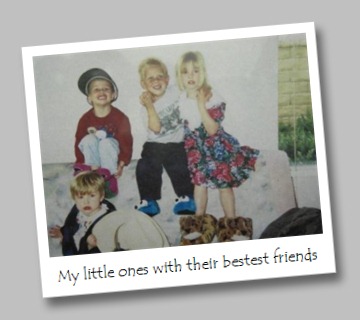(This is an excerpt from an excellent Empowering Parents article on how to handle the monumental task of keeping your teenager safe when they walk out the door. As I’m finding with my 18-year old (now invisible) daughter, it’s as important to make peace with what you aren’t responsible for as with what you are.)
Parenting Teens: Parental Authority vs. Peer Pressure
It’s one of the hardest things parents deal with: even if you’re trying to raise your child the right way, as soon as he walks out the door, you know he’s going to be exposed to all sorts of negative—even dangerous—influences. From dress to attitude to a popular culture that says it’s cool to drink and do drugs, parents have every right to be concerned. Are you afraid to send your child out the door? In this insightful one–on–one interview, James Lehman gives you some honest advice.
 JL: Like it or not, adolescents often gravitate toward the very things you fear and dislike. Your child doesn’t do this to annoy you; he’s doing it because his friends are doing it and because that’s the developmental stage he’s in. It’s a simple fact that even before your child hits the pre–teen years, he begins to pull away from you. Unfortunately, one of the primary ways he may do this is by engaging in behaviors you dislike. Suddenly, you see your 13–year–old daughter’s clothing and style morph into something age–inappropriate—or you notice that your shy 15–year–old son has started listening to music with violent or rude lyrics.
JL: Like it or not, adolescents often gravitate toward the very things you fear and dislike. Your child doesn’t do this to annoy you; he’s doing it because his friends are doing it and because that’s the developmental stage he’s in. It’s a simple fact that even before your child hits the pre–teen years, he begins to pull away from you. Unfortunately, one of the primary ways he may do this is by engaging in behaviors you dislike. Suddenly, you see your 13–year–old daughter’s clothing and style morph into something age–inappropriate—or you notice that your shy 15–year–old son has started listening to music with violent or rude lyrics.
It’s important to remember that, as an adolescent, your child is learning how to be part of a group—and he’s terrified of not fitting in. Kids learn that to go along with others, you either enjoy what they’re doing or learn to hide your true feelings as a way to get by. And don’t forget, functionally, adolescents don’t want to just “get by” with their friends; they want to be popular and well–liked. In fact, the drive to be popular is probably the core value of most adolescents—and they often simply don’t realize what shaky ground they’re standing on when they take on that value.
Fitting into a group drives your teen’s development and defines who he is. Resisting authority makes him feel like an individual because he’s reaffirming who he is by resisting an outside influence. And in this case, you are the outside influence your child is resisting. Get ready, because if you don’t like something, he’s going to like it even more. Listening to music you don’t like feeds into his feeling of individuation—his sense of wanting to become his own individual. It’s not necessarily that he wants you to dislike his music, but if you do, that’s fine with him. The same thing happens with clothes, movies, and pop culture. The downside to that is that in our culture today, adolescents have access to very dangerous things—like drugs and alcohol—to a much greater degree than teens did 50 years ago. And that access gets easier as time goes on. Every year, younger and younger children can get drugs and alcohol. In my years of working with kids in high school, they would brag to me that they could get anything they wanted. And I’d question them. I’d say, “You mean like sleeping pills and barbiturates? Pain pills?” And they would answer, “Yeah, and heroin, crystal meth and coke.” Needless to say, these are very dangerous drugs—drugs where if you slip up and use too much, you die. Not only are they highly addictive, they’re fatal.
I think that children aren’t ready for that kind of temptation, and if their friends are doing it, they’re very much at risk. Now, in most areas, the peer pressure is not about hard drugs. In fact, I believe some of the peer pressure is against hard drugs. But certainly there’s a lot of pressure to use the drugs that kids see as “soft”: pot, ecstasy, and pharmaceuticals. And I want to clarify that I personally don’t see those substances as soft drugs—this is just how kids have presented the information to me.
So what’s going on in your child’s head? He thinks that nobody understands him but his peers. He thinks his parents are old–fashioned. He doesn’t like parental authority at this stage in his life. It’s an age where he’s actively looking for reasons to reject adults. Many times he’ll think, “If my parents believe something or like it, it’s automatically wrong.” Or he shrugs off whatever you say. All of these things factor into his readiness to test you, push the limits, and discard the opinions and insights of adults. You’ll find that you can hardly even give your adolescent child compliments—much less constructive criticism—without getting a defiant retort.
EP: How much control do you have over the things to which your child is exposed?
JL: I think it’s important to understand that you have no control over what your children are exposed to when they leave for the day. I mean, if you drive them to school during the school year, then they won’t be exposed to stuff on the school bus. But make no mistake, they’re exposed to whatever happens once they get there. If they go to an all–boys or an all–girls school, then they won’t be exposed to the opposite sex there, and that’s a choice many parents make. There are some things you can manage, but basically if your child lives in the world, your child will be exposed to the world. And unfortunately, it’s the same world you and I are exposed to, even though kids don’t have the mental capacity or maturity level that we have to deal with it. It’s a risky proposition, and I understand that.
So the only secondary control you have is through the beliefs, values, and morals that you teach to your kids. As a parent, you hope they’re going to make good decisions and that those values will exert some force opposing the negative influences out there. But each child is different, just like each adult is different, and there’s nothing you can do about that. Personally, I think parents expect too much of themselves if they think their own behavior in the home will prevent their child from making any mistakes in life.
Listen, I understand that it’s the most vulnerable thing in the world to know that your child is out there alone making decisions, some of which may be life–threatening. I’m not only talking about drug and alcohol use, but also decisions about shoplifting, risky sexual behavior, and who your child talks to online. And make no bones about it, if your child is committing crimes, he’s going to be arrested for them, and when he turns 18, he will be tried as an adult. Believe me, that’s going to affect him for the rest of their his life.
So parents have every reason to be concerned and worried, and to feel vulnerable. There’s nothing you can do except run a home where values are promoted and talked about. Don’t get into fights about it with your child—just keep your values clear. Values like “If you cop out with drugs and alcohol, you’ll miss the things you need to learn.”
There really are no easy answers. The idea of letting a child out into the world filled with dangers is a parent’s worst nightmare. One of the reasons it’s so hard is because you’re powerless over your kids. You spend all these years protecting your kids; you’re ready to jump in front of a bus to save them, but when the day comes when they do something risky, you’re powerless over it. It’s awful, but parenting is not for sissies.
I think the best thing you can do as a parent is to recognize your own limitations and learn how to be more effective if you can. And then really put a lot into those areas where it matters and keep role modeling.




 But as emotional as it all is, she’s doing remarkably well for a “newborn.” She has not one but two jobs, her own checking account, a healthy sense of self-confidence, and is sailing with (what I hope is) a strong moral compass.
But as emotional as it all is, she’s doing remarkably well for a “newborn.” She has not one but two jobs, her own checking account, a healthy sense of self-confidence, and is sailing with (what I hope is) a strong moral compass. 




![Coffee_thumb[5] Coffee_thumb[5]](https://teenparentcafe.files.wordpress.com/2011/04/coffee_thumb5_thumb1.jpg?w=100&h=117)




![Coffee_thumb[5] Coffee_thumb[5]](https://teenparentcafe.files.wordpress.com/2011/04/coffee_thumb5_thumb2.jpg?w=100&h=117)



![Coffee_thumb[5] Coffee_thumb[5]](https://teenparentcafe.files.wordpress.com/2011/04/coffee_thumb5_thumb3.jpg?w=100&h=117)

